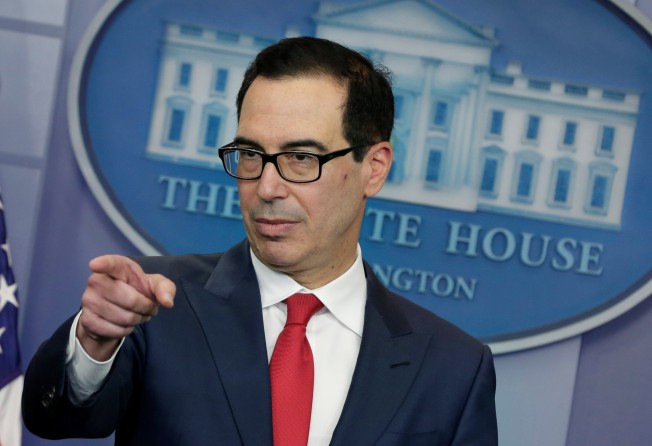A US-China trade deal can end ‘Chimerica’ on a positive note
Tomas Casas says the current bilateral trade relationship, in which Chinese companies grow off of US consumption and Americans enjoy low interest rates, will inevitably end. A good deal now can unwind that arrangement with balanced trade flows that leave both sides better off

A main demand of US Treasury Secretary Steven Mnuchin’s delegation to Beijing last week was that China cut its trade deficit by US$200 billion. China was busy preparing for the 200th anniversary of Karl Marx’s birth, so the trade discussions were not exactly the centre of attention in the People’s Republic. But if a point was missed, it is that United States needs that US$200 billion.
Actually, it needs US$375 billion, the full trade deficit it claims with China (in the form of cut-rate Chinese loans priced at America’s own low interest rates, that is). After all, China can only lend to the US if it first accumulates dollars via trade surpluses.
Behind this unbalanced trade relationship, there is a more fundamental reality; the unavoidable unwinding of “Chimerica”. Coined by Niall Ferguson and Moritz Schularick in 2006, the term refers to the symbiotic but unbalanced economic relationship between the two global powers. China’s excess savings turn into trade surpluses, while America’s craving for capital results in trade deficits.
For nearly two decades, both sides have benefited from Chimerica. China’s development was fuelled by foreign corporations investing and producing for global markets, while Chinese firms raised their competitiveness by exporting to advanced Western countries. Americans enjoyed depressed interest rates and consumption beyond their means, while corporations made more profits than ever.
Why would a US president wish to fiddle with this cosy arrangement?
In the 1980s, current US President Donald Trump was bashing Japan, to him a mercantilist upstart taking advantage of free and open American markets. He saw destroyed American jobs, battered American firms and distorted economic activity. Today Trump still has issues with the fairness of Japan’s trade practices, its monetary policy a device for a weaker yen. Yet, perceiving China as the US’ main rival, he appointed Peter Navarro, author of Death by China: Confronting the Dragon – A Global Call to Action and The Coming China Wars, as director of the White House National Trade Council.
Japan seems not to have realised that trade surpluses accruing through the keiretsu system, favourable exchange rates or activist industrial policy, eventually make the export champion poorer by transferring labour and wealth to the importing country. Do China’s leaders understand Japan’s 30-year stagnation and how mercantilism backfires? Sure, but on a per capita basis, China is only about a quarter as rich as Japan, and so needs growth to avoid the dreaded middle-income trap. The necessary productivity increases will come via exports and government support for innovation.

The point is that such policies might be circumstantial. The gradual dismantling of Chimerica and diminished trade surpluses have clear benefits: greater domestic consumption and a stable international system.
What if the present trade dispute was not about trade, but rather about geopolitics meeting domestic sentiment? Navarro’s “global call to action” sees American companies not competing with Chinese counterparts, but – unfairly – with the Chinese state. This pugnacious narrative might explain why when Trump challenges China, his approval ratings appear to raise. If the dispute is about the Thucydides trap, where the existing superpower fears the emergent newcomer, escalating trade clashes are but the first act of a larger struggle.
Could the spectre of trade conflict stop actual trade conflict? With restricted access to US markets and technologies, China’s economic development will be encumbered. Exporters would suffer from excess capacity while reduced availabilities of key components like semiconductors will impede many industries.
American constituencies would likewise hurt. China recently imposed new restrictions on US soybeans, which represent 60 per cent of the US crop exports. Barriers to competitive Chinese goods will also mean inflation.
Price-sensitive American consumers, export-oriented farmers, corporations with long China supply chains, Wall Street financiers and the federal government desiring cheap capital … it is hard to see how they all would cope with an abrupt end of the “symbiotic economic relationship”.
Pressure on Trump to close a deal will likely come from within. The shots will be called not by Navarro but Mnuchin, the pragmatic former Wall Streeter. Unpredictable turns await, but Trump will likely want a deal on trade with China.
The win-win solution starts with steps towards more balanced trade flows: China imports more while its exports are not restricted. Alibaba’s e-commerce platform and the massive China International Import Exposition in Shanghai this November have precisely this mandate.
In parallel, capital flows must balance. When America’s savings rate increases, its voracious appetite for foreign capital will diminish. A rise in interest rates might nudge the country in the right direction.
The economic rationality of the art-of-the-deal scenario has worrisome aspects. Deal-making risks a no-deal situation on the way to unwinding Chimerica. A balanced economic relationship will emerge most positively from solid economic principles. Then the derived rules would be relevant for countries not at the superpowers’ negotiating table.
Dr Tomas Casas is assistant professor at the University of St Gallen’s Research Institute for International Management